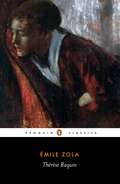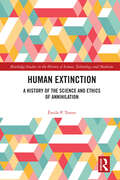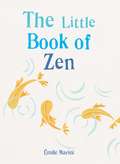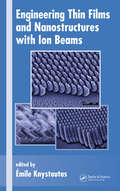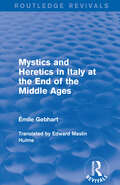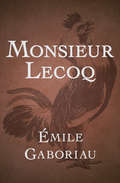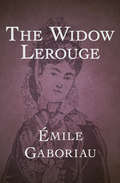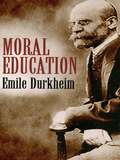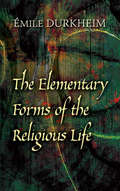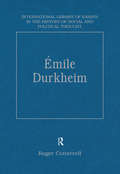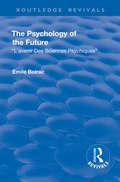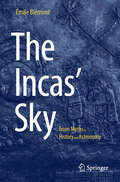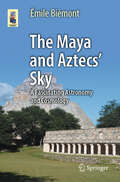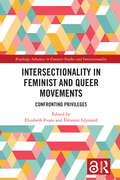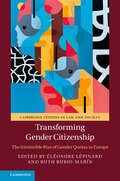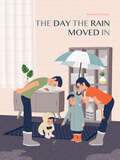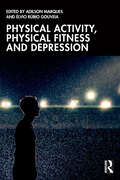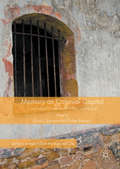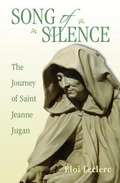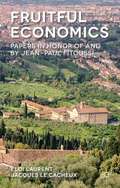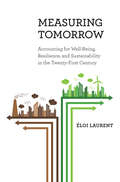- Table View
- List View
Thérèse Raquin
by Émile ZolaSet in the claustrophobic atmosphere of a dingy haberdasher's shop in the passage du Pont-Neuf in Paris, this powerful novel tells how the heroine and her lover, Laurent, kill her husband, Camille, but are subsequently haunted by visions of the dead man and prevented from enjoying the fruits of their crime. Published in 1867, this is Zola's most important work before the Rougon-Macquart series and introduces many of the themes that can be traced through the later novel cycle.
Human Extinction: A History of the Science and Ethics of Annihilation (Routledge Studies in the History of Science, Technology and Medicine)
by Émile P. TorresThis volume traces the origins and evolution of the idea of human extinction, from the ancient Presocratics through contemporary work on "existential risks." Many leading intellectuals agree that the risk of human extinction this century may be higher than at any point in our 300,000-year history as a species. This book provides insight on the key questions that inform this discussion, including when humans began to worry about their own extinction and how the debate has changed over time. It establishes a new theoretical foundation for thinking about the ethics of our extinction, arguing that extinction would be very bad under most circumstances, although the outcome might be, on balance, good. Throughout the book, graphs, tables, and images further illustrate how human choices and attitudes about extinction have evolved in Western history. In its thorough examination of humanity’s past, this book also provides a starting point for understanding our future. Although accessible enough to be read by undergraduates, Human Extinction contains new and thought-provoking research that will benefit even established academic philosophers and historians.
The Little Book of Zen
by Émile MariniTreat the stresses of modern-day life with The Little Book of Zen. Who knew so much wisdom could come in such a small package? This little book is packed full of easy practices and meditations to help you introduce the principles of Zen Buddhism into your day-to-day: enhance your spiritual, physical and mental wellbeing, tune into your natural intuition, and find your inner calm. Beautifully presented, this book is the perfect introduction to this ancient practice.Contents:Chapter 1: The Overflowing Teacup and the Beginner's Mind Chapter 2: A Practical Guide to Meditation Chapter 3: The Moon in Water - Understanding What We Can't Understand Chapter 4: Every Day Is a Good Day - Zen and the Art of Suffering Chapter 5: Wash Your Bowl - Zen and the Physical World
The Little Book of Zen
by Émile MariniTreat the stresses of modern-day life with The Little Book of Zen. Who knew so much wisdom could come in such a small package? This little book is packed full of easy practices and meditations to help you introduce the principles of Zen Buddhism into your day-to-day: enhance your spiritual, physical and mental wellbeing, tune into your natural intuition, and find your inner calm. Beautifully presented, this book is the perfect introduction to this ancient practice.Contents:Chapter 1: The Overflowing Teacup and the Beginner's Mind Chapter 2: A Practical Guide to Meditation Chapter 3: The Moon in Water - Understanding What We Can't Understand Chapter 4: Every Day Is a Good Day - Zen and the Art of Suffering Chapter 5: Wash Your Bowl - Zen and the Physical World
Engineering Thin Films and Nanostructures with Ion Beams (Optical Science and Engineering)
by Émile KnystautasWhile ion-beam techniques have been used to create thin films in the semiconductor industry for several decades, these methods have been too costly for other surface treatment applications. However, as manufacturing devices become increasingly smaller, the use of a directed-energy ion beam is finding novel industrial applications that require the custom tailoring of new materials and devices, including magnetic storage devices, photonics, opto-electronics, and molecular transport. Engineering Thin Films and Nanostructures with Ion Beams offers a thorough narrative of the recent advances that make this technology relevant to current and future applications.Featuring internationally recognized researchers, the book compiles their expertise in a multidimensional source that:Highlights the mechanisms and visual evidence of the effects of single-ion impacts on metallic surfacesConsiders how ion-beam techniques can help achieve higher disk-drive densities Introduces gas-cluster ion-beam technology and reviews its precedentsExplains how ion beams are used to aggregate metals and semiconductors into nanoclusters with nonlinear optical propertiesAddresses current challenges in building equipment needed to produce nanostructures in an industrial setting Examines the combination of ion-beam techniques, particularly with physical vapor deposition Delineates the fabrication of nanopillars, nanoflowers, and interconnected nanochannels in three dimensions by using atomic shadowing techniques Illustrates the production of nanopores of varying dimensions in polymer films, alloys, and superconductors using ion-beam irradiationShows how fingerprints can be made more reliable as forensic evidence by recoil-mixing them into the substrate using ion beamsFrom the basics of the ion-beam modification of materials to state-of-the-art applications, Engineering Th
Mystics and Heretics in Italy at the End of the Middle Ages (Routledge Revivals)
by Émile GebhartOriginally published in 1922, this translation of French historian Émile Gebhart’s work by Hulme gives a detailed religious history of Italy in the middle ages clearly demonstrating Gebhart’s expertise in this area. Poetry, art and politics all centred around religion in the period studied and Gebhart identifies three key areas to be discussed; the Church in Rome, Christian concern and rationalism or secular independence whilst also focussing on famous heretics of the period including Arnold of Brescia and Francis of Assisi. This title will be of interest to students of History.
Monsieur Lecoq
by Émile GaboriauThe seminal detective novel by Émile Gaboriau, who was hailed by André Gide as"the father of all current detective fiction" Policemen patrolling the streets of Paris hear a commotion in a nearby bar. When they go inside to investigate, they find 3 men dead and 1 gravely wounded. The injured man, taken into custody by the police, claims to have murdered the others in self-defense, but he dies without giving any further information. Who was this man? His attire is that of a soldier, but his long, unkempt hair suggests he led a different kind of life. Without knowing the true identities of the murderer or his victims, how can this case be solved? It is up to the immensely perceptive Monsieur Lecoq and his uncanny powers of observation to solve this tangled homicide. This ebook has been professionally proofread to ensure accuracy and readability on all devices.
The Widow Lerouge
by Émile GaboriauThe 1st book featuring Monsieur Lecoq--Paris's most perceptive detective, and a precursor to Sherlock Holmes The Widow Lerouge lived alone in an isolated cottage on the outskirts of Paris. When she is not seen for several days, her neighbors alert the gendarmes, who discover that the widow has been savagely murdered in her home. But who would have committed such a monstrous crime? The local police force is stumped. Enter Monsieur Tabaret--a former clerk who is also a remarkably astute amateur detective. It is up to Tabaret and the clever Monsieur Lecoq to unravel the mystery and apprehend the killer. Considered the father of modern detective fiction, author Émile Gaboriau has crafted a spellbinding classic mystery. This ebook has been professionally proofread to ensure accuracy and readability on all devices.
Moral Education
by Émile DurkheimThe great French sociologist and philosopher Emile Durkheim is best known for his classic book Suicide (1897), a landmark in social psychology. Among his other major works is this study in the sociology of education, which features 18 lectures by an influential theorist who discusses his ideas on the school as the appropriate setting for moral education. The first element in developing a moral being, he maintains, is instilling a sense of discipline, followed by a willingness to behave in terms of the group's collective interest, and a sense of autonomy. Durkheim also examines discipline and the psychology of the child, discipline of the school and the use of punishment, altruism in the child, the influence of the school environment, and the teaching of science, aesthetics, and history. Perceptive and provocative, this volume abounds in valuable insights for teachers and others involved in education.
The Elementary Forms of the Religious Life
by Émile Durkheim Joseph Ward SwainIn this 1912 classic, a founder of modern sociology seeks the enduring source of human social identity. Émile Durkheim presents a remarkably accessible examination of animism, naturism, totemism, myth, and ritual. His intriguing views and ultimate conclusion--that the source of religion and morality lies in collective consciousness, rather than in individual minds--remains a topic of debate among sociologists, anthropologists, ethnographers, philosophers, and theologians.Durkheim edited L'Année Sociologique, the first journal of sociology, and was instrumental in establishing the field as a social science. With The Elementary Forms of the Religious Life, he explores totemism among Australia's Aborigines, offering the opportunity "to yield an understanding of the religious nature of man, by showing us an essential and permanent aspect of humanity." Durkheim's study focuses on the need and capacity of humans to relate to one another socially, with religion as the core of the moral universe. An excellent introduction to the influential sociologist's ideas, this book continues to speak to new generations about the intriguing origin and nature of religion and society.
Émile Durkheim: Justice, Morality and Politics (International Library of Essays in the History of Social and Political Thought)
by Émile DurkheimThis volume focuses on three closely-connected aspects of Émile Durkheim's work: his sociology of justice, his sociology of morality and his political sociology. These areas of his thought are the most relevant and practical today in considering fundamental problems of contemporary societies and they provide many of the richest and most important insights of his social theory. Yet they are also relatively neglected and this volume collects together the most incisive recent periodical commentary on them. Within the justice-morality-politics triangle, Durkheim examines moral pluralism and the possibility of identifying a unifying value system for complex societies; the nature and conditions of democracy; the relations of the citizen, the state and corporate groups; criteria of justice and of effective economic regulation; and modern individualism with its associated ideas of human dignity and human rights. This tightly-integrated volume presents Durkheim's thought in an unusual and revealing light, showing him as a key social and political thinker for the twenty-first century.
Revival: L'Avenir des Sciences Psychiques (Routledge Revivals)
by Émile BoiracMaterial contained in this book constitute an entirely new departure in the field of psychological study and experimentation.
The Incas' Sky: From Myths to History and Astronomy
by Émile BiémontThis book introduces readers to the astonishing civilisation of the Incas. Its novelty lies in its general but highly informative synthesis of their history and astronomy through the accounts of contemporary chronicles and recent archaeological findings. Richly illustrated with the author’s own photographs, it will attract the attention of seasoned travellers interested in ancient civilisations and keen to discover what people were capable of achieving so long ago, but also any reader interested in the history and prehistory of South American peoples, including students or university researchers wanting to know more about the pre-Columbian civilizations of Peru. The Inca civilisation was in fact the culmination of cultural contributions from a dozen or so complex pre-Columbian civilizations, such as those of Chavín, Nazca, Wari, or Tiwanaku. Intensely spiritual, the Inca people attributed metaphysical powers to all manner of objects and places they considered sacred, but at the same time the numerous alignments in their buildings show that they result from careful observations of the Sun, the Moon, and the stars at different times of the year. Indeed, the Incas were an essentially agrarian people, so time measurement and calendar devices were essential for the purely pragmatic problem of planning agricultural tasks during the tropical year. The book sets out to describe the Incas in their historical and geographical context, avoiding specialization or excessive technicality, but retaining a certain scientific rigor, and including a detailed consideration of their interest in the sky and astronomy.
The Maya and Aztecs' Sky: A Fascinating Astronomy and Cosmology (Astronomers' Universe)
by Émile BiémontThis book immerses the reader in the fascinating history of the Mesoamerican peoples, Aztec and Maya in particular. Although these two Mesoamerican cultures developed at very different periods, they present numerous convergences and similarities, from an attraction to ritual ball games to advanced astronomical knowledge and close intertwining of the lives of people and the observation of the sky. Astronomy provided a relationship between religious ideas and daily or seasonal agricultural practices and was therefore of major importance in Mesoamerican societies. This work highlights the importance of time-measuring devices and calendars used for planning of agricultural tasks during the different seasons and sacred rituals. The history of the Aztec and Maya people, strongly associated with legends and myths, is imbued with an astonishing and omnipresent spirituality which is discussed in detail in this work. The pantheon of these two peoples was very extensive, the religion often integrating the heritage of previous cultures in the same way that the empire appropriated the artisanal know-how of the conquered regions. Amply illustrated with photographs by the author and documents from codices, this book is aimed at a very wide audience, from enthusiasts of history, ethnology, and astronomy to students or researchers interested in the pre-Hispanic civilizations of Mexico.
Intersectionality in Feminist and Queer Movements: Confronting Privileges (Routledge Advances in Feminist Studies and Intersectionality)
by Elizabeth Evans Éléonore LépinardExamining the ways in which feminist and queer activists confront privilege through the use of intersectionality, this edited collection presents empirical case studies from around the world to consider how intersectionality has been taken up (or indeed contested) by activists in order to expose and resist privilege. The volume sets out three key ways in which intersectionality operates within feminist and queer movements: it is used as a collective identity, as a strategy for forming coalitions, and as a repertoire for inclusivity. The case studies presented in this book then evaluate the extent to which some, or all, of these types of intersectional activism are used to confront manifestations of privilege. Drawing upon a wide range of cases from across time and space, this volume explores the difficulties with which activists often grapple when it comes to translating the desire for intersectionality into a praxis which confronts privilege. Addressing inter-related and politically relevant questions concerning how we apply and theorise intersectionality in our studies of feminist and queer movements, this timely edited collection will be of interest to students and scholars from across the social sciences and humanities with an interest in gender and feminism, LGBT+ and queer studies, and social movement studies.
Transforming Gender Citizenship: The Irresistible Rise of Gender Quotas in Europe (Cambridge Studies in Law and Society)
by Ruth Rubio-Marín Éléonore LépinardGender quotas are a controversial policy measure. However, over the past twenty years they have been widely adopted around the world and especially in Europe. They are now used in politics, corporate boards, state and local public administration and even in civil society organizations. This book explores this unprecedented phenomenon, providing a unique comparative perspective on gender quotas' adoption across thirteen European countries. It also studies resistance to gender quotas by political parties and supreme courts. Providing up-to-date comprehensive data on gender quotas regulations, Transforming Gender Citizenship proposes a typology of countries, from those which have embraced gender quotas as a new way to promote gender equality in all spheres of social life, to those who have consistently refused gender quotas as a tool for gender equality. Reflecting on divergences and commonalities across Europe, the authors analyze how gender quotas may transform dominant conception of citizenship and gender equality.
The Day the Rain Moved In
by Éléonore DouspisIn this beautiful picture book, the wondrous merges with the ordinary when it starts to rain … inside the house! One day, it starts to rain in Pauline and Louis’s house. The whole family looks for the source of the rain, but nothing can be found! Dad tries to mop up the puddles that form on the floor, Mom holds an umbrella over her head to read, and Pauline and Louis wear their raincoats. Everyone tries to pretend that nothing is wrong. Pauline and Louis are embarrassed and try to keep their rainy house a secret from the other kids at school, expecting to be teased. What would happen if someone found out? Outside, the sun is shining. But inside the house, something new is happening. Plants sprout from the carpet, the bathtub and the kitchen sink. A giant tree spreads its branches through the living room. The neighborhood children, curious about the leaves they see through the windows, come inside. Instead of teasing, they want to play. Pauline and Louis aren’t alone with their secret any longer. In fact, having a tree in the house is kind of fun! Soon, the branches grow too big for the house, and sunlight streams in through holes in the roof. There’s something else, new, too — the rain has finally stopped. A story about embracing difference, celebrating the wondrous and expecting the best from our friends. This nuanced and layered story will have both very young and school-aged children requesting repeated readings. Correlates to the Common Core State Standards in English Language Arts: CCSS.ELA-LITERACY.RL.2.3 Describe how characters in a story respond to major events and challenges.
Physical Activity, Physical Fitness and Depression
by Adilson Marques Élvio Rúbio GouveiaThis innovative book, Physical Activity, Physical Fitness and Depression, brings together critical reviews of issues in the relationship between physical activity, fitness, and depression, stimulating individual reflection and including debate on current research, methodologies, and applied practices. This book helps the reader understand the magnitude of depression as a disease that has increased its prevalence in recent decades and the other health problems associated with it. Since psychotherapy and pharmacotherapy are often used to treat depression, this exponentially increases health costs for national health systems. In addition, there are always side effects associated with pharmacotherapy. Therefore, other ways, less expensive and without side effects, for treating depression are important. This book outlines the ways that physical activity and physical fitness are viable options for preventing and treating depression. Designed as a supplementary textbook, Physical Activity, Physical Fitness and Depression is key reading for students and academics alike in the areas of sports science, sport psychology, sports therapy, and psychology, and with its thematic content, the book’s allure extends to professionals, including practitioners, psychologists, psychiatrists, and sports organisations, who stand to gain valuable insights from its contents.
Memory as Colonial Capital
by Erica L. Johnson Éloïse BrezaultThis volume examines the ways that writers from the Caribbean, Africa, and the U. S. theorize and employ postcolonial memory in ways that expose or challenge colonial narratives of the past, and shows how memory assumes particular forms and values in post/colonial contexts in twenty and twenty-first-century works. The problem of contested memory and colonial history continues to be an urgent and timely issue, as colonial history has served to crush, erase and manipulate collective and individual memories. Indeed, the most powerful mechanism of colonial discourse is that which alters and silences local histories and even individuals' memories in service to colonial authority. Johnson and Brezault work to contextualize the politics of writing memory in the shadow of colonial history, creating a collection that pioneers a postcolonial turn in cultural memory studies suitable for scholars interested in cultural memory, postcolonial, Francophone and ethnic studies.
Song of Silence
by Éloi LeclercSaint Jeanne Jugan, foundress of the Little Sisters of the Poor, was not recognized as such until after her death. Jeanne lived through repeated betrayals and transformed these trials into a path toward holiness that helped her connect with the suffering of Christ. Read the fascinating spiritual journey of this remarkable saint.
Fruitful Economics
by Éloi Laurent Jacques Le CacheuxJean-Paul Fitoussi has left a big mark both in terms of scholarship and policy-making influence around the world, and even more in Europe and France. Fitoussi's pluralistic approach has shaped modern macroeconomics, political economy, economics of inequality and, more recently, the economics of sustainability. This volume is both a tribute to and study of the French economist Jean-Paul Fitoussi. The text is edited by two of Fitoussi's closest collaborators over the years and includes contributions from five Nobel Prize winners, all also Fitoussi's co-authors and friends: Kenneth Arrow, Edmund Phelps, Amartya Sen, Robert Solow and Joseph Stiglitz. The volume editors provide a comprehensive introduction which contextualises Fitoussi's work and discusses his interpretations of Keynesian economics and the financial crises, as well as a broad outline of his ideas. The contributors closely examine Fitoussi's macroeconomic theory on managing economic policy, his ideas on Europe's integration, sustainability and measurement of the economic world. The format of the volume is original, since it allows Fitoussi to respond to three of the five Nobel prize winners, and is unique in providing a wide scope of opinions from top authorities in the field. This collection is a key study of Fitoussi's ideas making it essential reading for students and researchers of macroeconomic policy, European political economy and sustainability, as well as being of importance to policy-makers, civil-servants and the interested lay person.
Measuring Tomorrow: Accounting for Well-Being, Resilience, and Sustainability in the Twenty-First Century
by Éloi LaurentHow moving beyond GDP will improve well-being and sustainabilityNever before in human history have we produced so much data, and this empirical revolution has shaped economic research and policy profoundly. But are we measuring, and thus managing, the right things—those that will help us solve the real social, economic, political, and environmental challenges of the twenty-first century? In Measuring Tomorrow, Éloi Laurent argues that we need to move away from narrowly useful metrics such as gross domestic product and instead use broader ones that aim at well-being, resilience, and sustainability. By doing so, countries will be able to shift their focus away from infinite and unrealistic growth and toward social justice and quality of life for their citizens.The time has come for these broader metrics to become more than just descriptive, Laurent argues; applied carefully by private and public decision makers, they can foster genuine progress. He begins by taking stock of the booming field of well-being and sustainability indicators, and explains the insights that the best of these can offer. He then shows how these indicators can be used to develop new policies, from the local to the global.An essential resource for scholars, students, and policymakers, Measuring Tomorrow covers all aspects of well-being—including health, education, and the environment—and incorporates a broad range of data and fascinating case studies from around the world: not just the United States and Europe but also China, Africa, the Middle East, and India.
